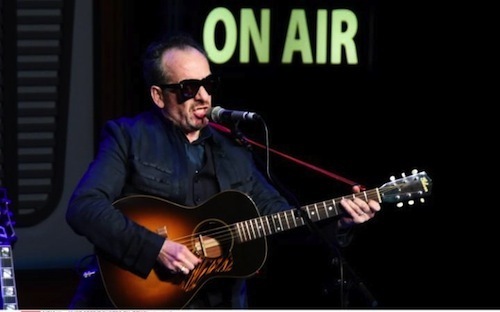
05.12.2016
ELVIS COSTELLO STILL HAS PLENTY OF TALENT TO BURN AT THE LONDON PALLADIUM
The Telegraph: Bernadette McNulty: 11th May 2016.
Elvis Costello has always been a man of many words. His latest tour is as much about his written and spoken ones as the hefty body of work he has turned out as a songwriter. Following on from Unfaithful Music and Disappearing Ink, his entertaining if self-excoriating autobiography last year, Detour delves into the roots of the boy born Declan MacManus who became the British New Wave wunderkind – and sees him sharing memories from his life on the road and the influence of his family and musical heroes interspersed with songs from across his back catalogue, all played without a band.
This was in no ways an earnest ‘unplugged’ set, though. Costello moved between electric guitar and piano, playing with the undiminished fury of his youth, packing in a dazzling range of numbers from the explosive run of albums he put out in the late Seventies and early Eighties: from Oliver’s Army and Accidents Will Happen up to new songs such as A Face in The Crowd that he said he was writing for a musical.
It was a fresh way of hearing the impressively energetic and still impishly bespectacled 61-year-old drawing the dots between the wildly different styles he has dipped into. As if making up for the lack of bodies on stage, Costello wrenched and wrangled his guitar with the calm fury of a serial killer, but the sound could sometimes not match his powerfully expressive voice, still one of the most distinctive Scouse American drawls in music but that, in the mix, sometimes ended up booming like a pub crooners wail.
The numbers where he dialled down the theatricality and let the words and music speak with more reserve were the most impressive. Shipbuilding, performed delicately on the piano, is still a plaintive wonder and one of the most perfect songs written, as near poetry as Costello has reached.
Alison was given added tenderness solo, while London’s Brilliant Parade, his 1994 love letter to the city he was born in, was evocatively nostalgic of a place that has near disappeared. Picking up a trick from Ed Sheeran, he used guitar loop pedals to transform Watching the Detectives into a spooky, dark dub nightmare, a flash of radical invention that would have been good to see him use more.
Costello’s anecdotes were funny, if well worn, but grew in emotional power the more he delved into his family tree, telling stories about the musical legacy his father and grandfather had created for him. A clip of his dad, bandleader of the Joe Loss Orchestra in the Sixties, was particularly poignant, looking physically like the spit of Costello and nearly bouncing off the screen with irrepressible energy. Later on, his account of his grandfather’s mixed fortunes ended with a reflection on how lucky Costello still sees himself to be able to play music
You could see that the quality that has often been seen as arrogance has perhaps rather been a burning sense of mission to be able to make a life in music in the way his forefathers couldn’t.
While Costello clearly has talent still to burn, it shines best when he has a foil to play off, and when he was joined by his support band, the American roots sister act, Larkin Poe, the evening really sparked over into a truly joyous celebration of his incredible music.